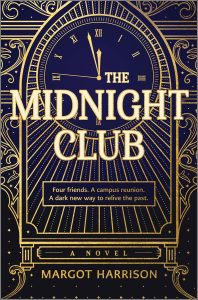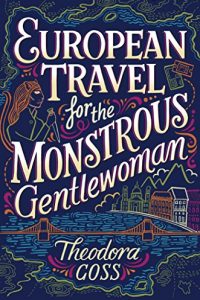The Midnight Club by Margot Harrison: Review by Gabino Iglesias
 The Midnight Club, Margot Harrison (Graydon House 978-1-52580-988-0, $28.00, 368pp, hc) September 2024.
The Midnight Club, Margot Harrison (Graydon House 978-1-52580-988-0, $28.00, 368pp, hc) September 2024.
Margot Harrison’s The Midnight Club is one of those novels that defies categorization. At its core, this is a murder mystery (or a mystery about a suicide that some folks think could have been a murder). However, it’s also a narrative about the changing nature of friendship as well as a science fiction tale about a substance that can make people relive the past. Jumping back and forth in time and concerned with memory, the way the past shaped us, and the way death can alter all dynamics, this is an intriguing, entertaining novel.
Sonia, Auraleigh, Byron, and Paul were good friends in college, 25 years ago. They worked together on their campus literary magazine and navigated that space between childhood and adulthood together. Sadly, they are also bonded by something more powerful and much darker than their nights at the magazine: the death of their friend Jennet during their junior year. Jennet suffered an accident, but some people suspect there was foul play involved. Now, a quarter of a century after it all went down, the friends get together again in the little Vermont town where everything began and where Auraleigh has called them. But Auraleigh doesn’t just want to talk about the past, catch up, and reminisce about their days at the magazine. No, Auraleigh wants them all to do everything in their power to get answers regarding Jennet’s death. To do so, she gives them all sog, a substance that makes people relive the past. But sog is dangerous. No one really understands how it works, and people who use it too much end up confused, or stuck in some other time, or some other reality. To make matters worse, the friends’ use of sog and ventures into the past in search of answers are complicated by the secrets they hide.
The Midnight Club works on different levels. First, there’s the mystery surrounding Jennet’s death, which gets weirder and more interesting as the narrative progresses. Then there is the variety of points of view Harrison deftly juggles. Getting different voices – different pasts, different secrets – makes for a richer, more complex story. Also, sog and everything it entails is perhaps some of the best stuff in the novel. The idea of being able to vividly relive your past is an enticing idea, but the author shows the bad that could come from that. Together, these elements make this novel an engaging read.
Despite everything it has going for it, the pacing of this novel will not be for everyone. Harrison meticulously develops her characters – especially in the context of who they were and what they did a quarter century ago and who they are and what they do in the present. She also builds the world, now and then, so that readers always feel like they are wherever the characters are. These things take time, and Harrison takes her time with them. The result is a novel that never crawls and is never boring, but it also never runs, and some passages feel like they could have been shorter while still retaining their effectiveness.
The idea of going back to the past and reliving some of our favorite moments is one I think everyone has had at some point. This novel is about that, and it shows that maybe the past should stay in the rearview mirror. Harrison, a talented storyteller with four young adult novels to her name, enters adult fiction with a strong debut that brings together some of the best elements of time-traveling stories and mixes them with the atmosphere of a whodunit. If you’re a fan of either – or both! – definitely check this one out.
Gabino Iglesias is a writer, journalist, professor, and book reviewer living in Austin TX. He is the author of Zero Saints and Coyote Songs and the editor of Both Sides. His work has been nominated to the Bram Stoker and Locus Awards and won the Wonderland Book Award for Best Novel in 2019. His short stories have appeared in a plethora of anthologies and his non-fiction has appeared in the New York Times, the Los Angeles Times, and CrimeReads. His work has been published in five languages, optioned for film, and praised by authors as diverse as Roxane Gay, David Joy, Jerry Stahl, and Meg Gardiner. His reviews appear regularly in places like NPR, Publishers Weekly, the San Francisco Chronicle, Criminal Element, Mystery Tribune, Vol. 1 Brooklyn, the Los Angeles Review of Books, and other print and online venues. He’s been a juror for the Shirley Jackson Awards twice and has judged the PANK Big Book Contest, the Splatterpunk Awards, and the Newfound Prose Prize. He teaches creative writing at Southern New Hampshire University’s online MFA program. You can find him on Twitter at @Gabino_Iglesias.
This review and more like it in the December 2024 issue of Locus.
 While you are here, please take a moment to support Locus with a one-time or recurring donation. We rely on reader donations to keep the magazine and site going, and would like to keep the site paywall free, but WE NEED YOUR FINANCIAL SUPPORT to continue quality coverage of the science fiction and fantasy field.
While you are here, please take a moment to support Locus with a one-time or recurring donation. We rely on reader donations to keep the magazine and site going, and would like to keep the site paywall free, but WE NEED YOUR FINANCIAL SUPPORT to continue quality coverage of the science fiction and fantasy field.
©Locus Magazine. Copyrighted material may not be republished without permission of LSFF.









